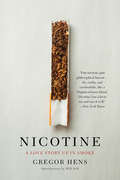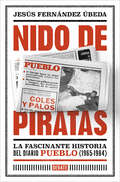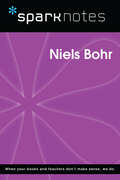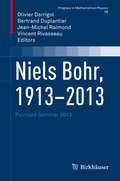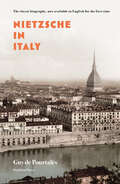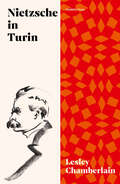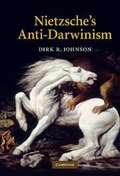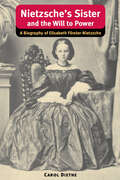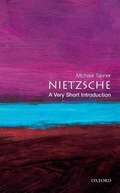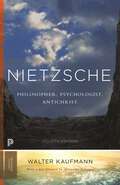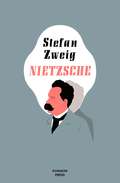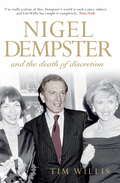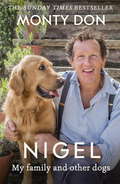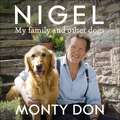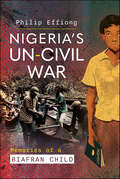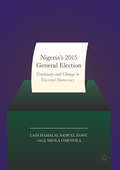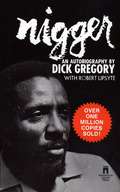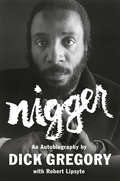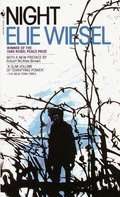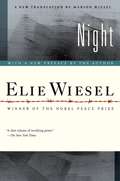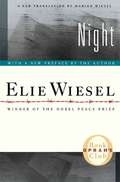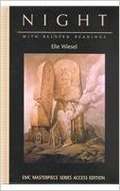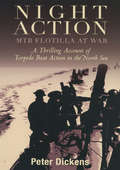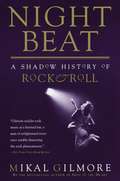- Table View
- List View
Nicotine
by Will Self Gregor Hens Jen CallejaBy turns philosophical and darkly comic, an ex-smoker's meditation on the nature and consequences of his nearly lifelong addiction Written with the passion of an obsessive, Nicotine addresses a lifelong addiction, from the thrill of the first drag to the perennial last last cigarette. Reflecting on his experiences as a smoker from a young age, Gregor Hens investigates the irreversible effects of nicotine on thought and patterns of behavior. He extends the conversation with other smokers to meditations on Mark Twain and Italo Svevo, the nature of habit, and the validity of hypnosis. With comic insight and meticulous precision, Hens deconstructs every facet of dependency, offering a brilliant analysis of the psychopathology of addiction. This is a book about the physical, emotional, and psychological power of nicotine as not only an addictive drug, but also a gateway to memory, a long trail of streetlights in the rearview mirror of a smoker's life. Cigarettes are sometimes a solace, sometimes a weakness, but always a witness and companion. This is a meditation, an ode, and a eulogy, one that will be passed hand-to-hand between close friends.
Nido de piratas: La fascinante historia del diario Pueblo (1965-1984)
by Jesús Fernández ÚbedaLas extraordinarias andanzas del diario Pueblo que, entre 1965 y 1984, congregó a las mayores leyendas del periodismo. «Aprendí el oficio en aquel asombroso nido de piratas que este magnífico libro de Jesús Fernández Úbeda, que sin duda habría sido uno de los nuestros, rescata del olvido».Arturo Pérez-Reverte, en el prólogo«En el pan, como hermanos; en la información, como gitanos». Nido de piratas es una historia del diario Pueblo, que comienza en 1964, cuando el periódico de los sindicatos verticales se traslada al número 73 de la madrileña calle de las Huertas. Bajo la batuta de Emilio Romero, y con una tirada de más de doscientos mil ejemplares, se encuentra en la cima del éxito. Entre whiskys, partidas de póker y una nube de humo de tabaco negro, se oye el inconfundible repiqueteo de las teclas de las Olivettis. Los reporteros y fotógrafos que se pelean por las exclusivas se cuentan por decenas. Y están dispuestos a todo. Así lo recuerdan en este libro muchos de los que por allí pasaron. Desde Arturo Pérez-Reverte hasta Rosa Villacastín, Carmen Rigalt, Raúl del Pozo, Julia Navarro (y su padre, Felipe Navarro, Yale) o Andrés Aberasturi. Pero también otros -abogados, curas, fotógrafos, peluqueros, etc.-, testigos directos de esa manera salvaje y apasionante de hacer periodismo.Pueblo, herido de muerte tras la salida de Romero, reacciona de forma tardía al golpe de Estado de Tejero, y sufre un fuerte recorte de plantilla y pérdidas millonarias. Aquel transatlántico en proceso de desguace se hunde irremediablemente. Esa parte de la historia, por desgracia, no parece tan ajena. Sus puertas cierran de forma definitiva en 1984, cuando el Gobierno de Felipe González termina de ejecutar el plan de Suárez de acabar con la prensa pública. Y, con él, desaparece una manera única, voraz y trepidante de entender el oficio. Críticas:«No es sólo el retrato de una forma de hacer periodismo que ya no existe, sino también de una forma de vivir que está desapareciendo a marchas forzadas».Enrique Bunbury «Un libro apasionante que refleja la vida de unos bucaneros, lo peor de cada casa, que se mataban por aparecer en primera página».Raúl del Pozo «Para casi todos los que conocían Pueblo, trabajar allí era como vivir una segunda infancia feliz».José María García«Llegué a colaborar unas cuantas veces en el inefable diario Pueblo que mi admirado Jesús Úbeda ha estudiado a la perfección en este libro ejemplar, a la vez una crónica de aquel filibusterismo periodístico que hoy añoramos tanto y un trabajo bien concebido y mejor rematado».Luis Alberto de Cuenca
Niels Bohr (SparkNotes Biography Guide)
by SparkNotesNiels Bohr (SparkNotes Biography Guide) Making the reading experience fun! SparkNotes Biography Guides examine the lives of historical luminaries, from Alexander the Great to Virginia Woolf. Each biography guide includes:An examination of the historical context in which the person lived A summary of the person&’s life and achievements A glossary of important terms, people, and events An in-depth look at the key epochs in the person&’s career Study questions and essay topics A review test Suggestions for further reading Whether you&’re a student of history or just a student cramming for a history exam, SparkNotes Biography guides are a reliable, thorough, and readable resource.
Niels Bohr, 1913-2013
by Vincent Rivasseau Olivier Darrigol Bertrand Duplantier Jean-Michel RaimondThis fourteenth volume in the Poincaré Seminar Series is devoted to Niels Bohr, his foundational contributions to understanding atomic structure and quantum theory and their continuing importance today. This book contains the following chapters: - Tomas Bohr, Keeping Things Open; - Olivier Darrigol, Bohr's Trilogy of 1913; -John Heilbron, The Mind that Created the Bohr Atom; - Serge Haroche & Jean-Michel Raimond, Bohr's Legacy in Cavity QED; - Alain Aspect, From Einstein, Bohr, Schrödinger to Bell and Feynman: a New Quantum Revolution?; - Antoine Browaeys, Interacting Cold Rydberg Atoms: A Toy Many-Body System; - Michel Bitbol & Stefano Osnaghi, Bohr´s Complementarity and Kant´s Epistemology. Dating from their origin in lectures to a broad scientific audience these seven chapters are of high educational value. This volume is of general interest to physicists, mathematicians and historians.
Nietzsche in Italy
by Guy De PourtalesA fascinating classic account of Nietzsche's travels in Italy at the end of the nineteenth century, where he found inspiration for his major works First published in 1929, Nietzsche in Italy has never been out of print in France but has never been translated into English until now.Endlessly fascinating and highly readable, Nietzsche in Italy will enthrall anyone interested in Nietzsche's relationship with the country that enriched his soul more than any other. For fifteen years, after his first visit to the country in 1876, Nietzsche was repeatedly and irresistibly drawn back to Italy's climate and lifestyle. It was there that he composed his most famous works, including Thus Spake Zarathustra and Ecce Homo. This classic biography follows the troubled philosopher from Rome, to Florence, via Venice, Sorrento, Genoa, Sicily and finally to the tragic denouement in Turin, the city in which Nietzsche found a final measure of contentment before his irretrievable collapse.
Nietzsche in Turin: The End of the Future
by Lesley ChamberlainBeautifully packaged reissue of the vividly lyrical biography of Nietzsche that John Banville called 'a major intellectual event'In 1888, philosopher Friedrich Nietzsche moved to Turin. This would be the year in which he wrote three of his greatest works: Twilight of the Idols, The Antichrist, and Ecce Homo; it would also be his last year of writing. He suffered a debilitating nervous breakdown in the first days of the following year. In this probing, elegant biography of that pivotal year, Lesley Chamberlain undoes popular clichés and misconceptions about Nietzsche by offering a deeply complex approach to his character and work. Focusing as much on Nietzsche's daily habits, anxieties and insecurities as on the development of his philosophy, Nietzsche in Turin offers a uniquely lively portrait of the great thinker, and of the furiously productive days that preceded his decline.
Nietzsche'S anti-Darwinism
by Dirk R. JohnsonFriedrich Nietzsche's complex connection to Charles Darwin has been much explored, and both scholarly and popular opinions have tended to assume a convergence in their thinking. In this study, Dirk Johnson challenges that assumption and takes seriously Nietzsche's own explicitly stated "anti-Darwinism. " He argues for the importance of Darwin for the development of Nietzsche's philosophy, but he places emphasis on the antagonistic character of their relationship and suggests that Nietzsche's mature critique against Darwin represents the key to understanding his broader (anti-)Darwinian position. He also offers an original reinterpretation of the Genealogy of Morals, a text long considered sympathetic to Darwinian naturalism, but which he argues should be taken as Nietzsche's most sophisticated critique of both Darwin and his followers. His book will appeal to all who are interested in the philosophy of Nietzsche and its cultural context.
Nietzsche's Sister and the Will to Power: A Biography of Elisabeth Förster-Nietzsche (International Nietzsche Studies)
by Carol DietheA penetrating study of the sister who betrayed and endangered her famous brother's legacy In 1901, a year after her brother Friedrich's death, Elisabeth Förster-Nietzsche published The Will to Power, a hasty compilation of writings he had never intended for print. In Nietzsche's Sister and the Will to Power, Carol Diethe contends that Förster-Nietzsche's own will to power and her desire to place herself--not her brother--at the center of cultural life in Germany are centrally responsible for Nietzsche's reputation as a belligerent and proto-Fascist thinker. Offering a new look at Nietzsche's sister from a feminist perspective, this spirited and erudite biography examines why Elisabeth Förster-Nietzsche recklessly consorted with anti-Semites, from her own husband to Hitler himself, out of convenience and a desire for revenge against a brother whose love for her waned after she caused the collapse of his friendship with Lou Salomé. The book also examines their family dynamics, Nietzsche's dismissal of his sister's early writing career, and the effects of limited education on intelligent women. Diethe concludes by detailing Förster-Nietzsche's brief marriage and her subsequent colonial venture in Paraguay, maintaining that her sporadic anti-Semitism was, like most things in her life, an expedient tool for cultivating personal success and status. A volume in the series International Nietzsche Studies, edited by Richard Schacht
Nietzsche: A Very Short Introduction
by Michael TannerFriedrich Nietzsche (1844-1900) was a German philosopher, almost wholly neglected during his sane life, which came to an abrupt end early in 1889. 'Nietzsche' is the figure in whose name people of the most astonishingly discrepant and various views have sought to find justification for them.
Nietzsche: Philosopher, Psychologist, Antichrist (Princeton Classics #3)
by Walter A. KaufmannThis classic is the benchmark against which all modern books about Nietzsche are measured. When Walter Kaufmann wrote it in the immediate aftermath of World War II, most scholars outside Germany viewed Nietzsche as part madman, part proto-Nazi, and almost wholly unphilosophical. Kaufmann rehabilitated Nietzsche nearly single-handedly, presenting his works as one of the great achievements of Western philosophy. Responding to the powerful myths and countermyths that had sprung up around Nietzsche, Kaufmann offered a patient, evenhanded account of his life and works, and of the uses and abuses to which subsequent generations had put his ideas. Without ignoring or downplaying the ugliness of many of Nietzsche's proclamations, he set them in the context of his work as a whole and of the counterexamples yielded by a responsible reading of his books. More positively, he presented Nietzsche's ideas about power as one of the great accomplishments of modern philosophy, arguing that his conception of the "will to power" was not a crude apology for ruthless self-assertion but must be linked to Nietzsche's equally profound ideas about sublimation. He also presented Nietzsche as a pioneer of modern psychology and argued that a key to understanding his overall philosophy is to see it as a reaction against Christianity. Many scholars in the past half century have taken issue with some of Kaufmann's interpretations, but the book ranks as one of the most influential accounts ever written of any major Western thinker. Featuring a new foreword by Alexander Nehamas, this Princeton Classics edition of Nietzsche introduces a new generation of readers to one the most influential accounts ever written of any major Western thinker.
Nietzsche: The Struggle With The Daemon (Master Builders Of The Spirit Ser.)
by Stefan ZweigA scintillating biographical study of the one of the greatest philosophers of the nineteenth century, by one of the bestselling writers of the twentieth.In this vivid biography, Zweig eschews traditional academic discussion and focuses on Nietzsche's habits, passions and obsessions. This work, concentrating on the man rather than the work, on the tragedy of his existence and his apartness from the world in which he moved in enforced isolation, is a tour de force, drawing the reader inexorably into Nietzsche's tragic trajectory.Illustrated with numerous photographs relating to Nietzsche and his European locations, this superb translation by Will Stone is essential reading for anyone interested in Nietzsche, Zweig, first-class biographies and philosophy.
Nigel Dempster and the Death of Discretion: The Life And Legacy Of The World's Greatest Gossip
by Tim WillisNo one is more responsible for Britain"s current obsession with celebrity culture than the late, great gossip columnist Nigel Dempster (1941-2007). For a quarter of a century, as the editor of the Daily Mail"s diary, he was the man perfectly placed and qualified to record - and accelerate - the end of the age of deference.
Nigel: my family and other dogs
by Monty DonTHE SUNDAY TIMES BESTSELLEWhen Monty Don's golden retriever Nigel became the surprise star of BBC Gardeners' World, inspiring huge interest, fan mail and his own social media accounts, Monty Don wanted to explore what makes us connect with animals quite so deeply. In many respects Nigel was a very ordinary dog; charming, handsome and obedient, as so many are. He was a much loved family pet. He was also a star. By telling Nigel's story, Monty relates his relationships with the other special dogs in his life in a memoir of his dogs past and very much present. Since it was first released in 2016, Monty Don's Nigel: my family and other dogs has sold over a quarter of a million copies, with Nigel, who sadly passed away in 2020, ensuring his place in the hearts of readers and dog lovers everywhere. This life-affirming memoir of the importance of dogs in Monty's life and in all our lives, is never more true than now.'I have always had a dog, or dogs. I cannot imagine life without them. I am just as much a fan of Nigel as any besotted viewer. In the book I explore why we love dogs and what they mean to us emotionally and domestically. I look back on all the dogs in my life - all of which I have loved deeply and which have been an essential part of my life. So, this is the book of Nigel - but also the book of all our dogs in every British family and a celebration of the deep love we feel for them' Monty Don
Nigel: my family and other dogs
by Monty DonTHE SUNDAY TIMES BESTSELLERWhen Monty Don's golden retriever Nigel became the surprise star of BBC Gardeners' World, inspiring huge interest, fan mail and his own social media accounts, Monty Don wanted to explore what makes us connect with animals quite so deeply. In many respects Nigel was a very ordinary dog; charming, handsome and obedient, as so many are. He was a much loved family pet. He was also a star. By telling Nigel's story, Monty relates his relationships with the other special dogs in his life in a memoir of his dogs past and very much present. Since it was first released in 2016, Monty Don's Nigel: my family and other dogs has sold over a quarter of a million copies, with Nigel, who sadly passed away in 2020, ensuring his place in the hearts of readers and dog lovers everywhere. This life-affirming memoir of the importance of dogs in Monty's life and in all our lives, is never more true than now.'I have always had a dog, or dogs. I cannot imagine life without them. I am just as much a fan of Nigel as any besotted viewer. In the book I explore why we love dogs and what they mean to us emotionally and domestically. I look back on all the dogs in my life - all of which I have loved deeply and which have been an essential part of my life. So, this is the book of Nigel - but also the book of all our dogs in every British family and a celebration of the deep love we feel for them' Monty Don
Nigel: my family and other dogs
by Monty DonWhen Monty Don's golden retriever Nigel became the surprise star of BBC Gardeners' World inspiring huge interest, fan mail and even his own social media accounts, Monty Don wanted to explore what makes us connect with animals quite so deeply. In many respects Nigel is a very ordinary dog; charming, handsome and obedient, as so many are. He is also a much loved family pet. He is also a star. By telling Nigel's story, Monty relates his relationships with other special dogs in his life in a memoir of his dogs past and very much present. Witty, touching and life-affirming, Nigel: My family and other dogs is wonderfully heart-warming. Monty Don is a great writer coming out of the garden and into the hearts and homes of every dog lover in the UK.'I have always had a dog, or dogs. I cannot imagine life without them. I am just as much a fan of Nigel as any besotted viewer. In the book I explore why we love dogs and what they mean to us emotionally and domestically. I look back on all the dogs in my life - all of which I have loved deeply and which have been an essential part of my life. So, this is the book of Nigel - but also the book of all our dogs in every British family and a celebration of the deep love we feel for them' Monty Don(P) 2016 Hodder & Stoughton Limited
Nigeria's Un-Civil War: Memories of a Biafran Child
by Philip Effiong"The peace had been desecrated. I knew because people spoke in low tones and laughter dried up. Outside, things unfolded without grace or color, even the harmattan leaves were more skeletal than usual. The sun still shone but didn’t smile; it was as if it could tell that the worst was yet to come. Change should not have been bad, but this one was heavy and stubborn. Months later I learned about the 15 January 1966 coup d’état." In Nigeria’s un-Civil War: Memories of a Biafran Child, Philip Effiong reveals the many characters of war: the horror and the chaos, the surrealism and the absurdity and the desperate need to conjure a semblance of normalcy against a backdrop of air raids, starvation and massacre. This is his, and his family’s, story before, during and after the Biafra–Nigeria War of July 1967 to January 1970. He begins in Lagos with the January 1966 coup and describes his high-ranking military father’s narrow assassination escape at the hands of the executors of the second coup six months later. Flight and relocation dog the next three-and-a-half years as his family tries to maintain a sense of stability amid crumbling education, health services and failing infrastructure. Lessons in literacy and numeracy are exchanged for creativity in foraging as food becomes ever scarcer. Death, fear, destitution and the madness in which the family repeatedly finds itself are told obliquely through a child’s eyes and leave the reader gutted by the senselessness and cruelty of war, yet equally buoyed by the resilience of the Biafran people’s inextinguishable hope.
Nigeria’s 2015 General Elections
by Ladi Hamalai Samuel Egwu J. Shola OmotolaThis book examines the significance of the 2015 elections in consolidating Nigeria's democracy, in the context of the difficulty of routinizing democracy since the attainment of nationhood in 1960 and the return to civil rule in May 1999, in particular. It offers a complete analysis of Nigeria's electoral process, outlining how the dynamics of limited changes in the constitutional, institutional, attitudinal and behavioural frameworks that underpin electoral competition played out in the elections. The authors further examine the conduct and outcome of the 2015 elections against the background of the pattern of electoralism that had been established since the return to democracy in 1999. In doing so, they draw attention to the dialectics of continuity and change that have been thrown up by the elections and how the lessons learned can be used to build a more enduring democratic system. The book will be of interest to students and academics of political science, development studies, democratisation and election studies, and African government and politics.
Nigger: An Autobiography
by Robert Lipsyte Dick GregoryAfrican-American comedian and political activist Dick Gregory tells his life story up to 1963, describing his poor childhood in St. Louis, Missouri; his rise to fame as a comedian; and his participation in the fight for racial equality, including his arrests.
Nigger: An Autobiography
by Robert Lipsyte Dick GregoryComedian and civil rights activist Dick Gregory’s million-copy-plus bestselling memoir—now in trade paperback for the first time.“Powerful and ugly and beautiful...a moving story of a man who deeply wants a world without malice and hate and is doing something about it.”—The New York TimesFifty-five years ago, in 1964, an incredibly honest and revealing memoir by one of the America's best-loved comedians and activists, Dick Gregory, was published. With a shocking title and breathtaking writing, Dick Gregory defined a genre and changed the way race was discussed in America.Telling stories that range from his hardscrabble childhood in St. Louis to his pioneering early days as a comedian to his indefatigable activism alongside Medgar Evers and Dr. Martin Luther King, Jr., Gregory's memoir riveted readers in the sixties. In the years and decades to come, the stories and lessons became more relevant than ever, and the book attained the status of a classic. The book has sold over a million copies and become core text about race relations and civil rights, continuing to inspire readers everywhere with Dick Gregory's incredible story about triumphing over racism and poverty to become an American legend.
Night
by Elie Wiesel Stella RodwayWhen Elie Wiesel was liberated from Buchenwald in 1945, having also been in Birkenau, Auschwitz, and Buna, he imposed a ten-year vow of silence upon himself before trying to describe what had happened to him and over six million other Jews. When he finally broke that silence, he had trouble finding a publisher. Such depressing subject matter. When Night was finally published, over twenty-five years ago, few people wanted to read about the Holocaust. Such depressing subject matter. But we cannot indefinitely avoid depressing subject matter, particularly if it is true, and in the subsequent quarter century the world has had to hear a story it would have preferred not to hear-the story of how a cultured people turned to genocide, and how the rest of the world, also composed of cultured people, remained silent in the face of genocide.
Night
by Elie Wiesel Marion WieselA new translation of Wiesel's landmark book Night, and the text of his 1986 Nobel Peace Prize Acceptance Speech.
Night
by Elie WieselBorn into a Jewish ghetto in Hungary, as a child, Elie Wiesel was sent to the Nazi concentration camps at Auschwitz and Buchenwald. This is his account of that atrocity: the ever-increasing horrors he endured, the loss of his family and his struggle to survive in a world that stripped him of humanity, dignity and faith. Describing in simple terms the tragic murder of a people from a survivor's perspective, Night is among the most personal, intimate and poignant of all accounts of the Holocaust.
Night (With Related Readings)
by Elie WieselAn autobiographical narrative in which the author describes his experiences in Nazi concentration camps, watching family and friends die, and how these experiences led him to believe that God is dead.
Night Action: MTB Flotilla at War: A Thrilling Account of Torpedo Boat Action in the North Sea
by Peter DickensA highly decorated Royal Navy officer recounts his experiences at the command of a motor torpedo boat in the North Sea during WWII. In 1942-43, Captain Peter Dickens commanded the 21st MTB Flotilla, mainly in the North Sea and the English Channel. In Night Action, he vividly recounts his experiences performing daring missions amid storms of gunfire, usually under the cover of darkness. Dickens and his crew managed to closely engage enemy convoys and escorts in high-speed attacks and wreak havoc among the German supply lines. Like the sailors who fought Nazi U-boats in the battle of the Atlantic, Dickens and his comrades were experiencing a new kind of warfare and had to develop techniques and tactics as they went along; their kind of action called for great courage, spilt-second timing and complete understanding between captain and crew. For his bravery and heroism, Dickens was awarded The Distinguished Service Order, a Distinguished Service Cross, and The Most Excellent Order of the British Empire. In Night Action, he offers a frank depiction of live aboard the 21st MTB Flotilla, combining comradery and humor with the true horror of war
Night Beat: A Shadow History of Rock and Roll
by Mikal GilmoreFew journalists have staked a territory as definitively and passionately as Mikal Gilmore in his twenty-year career writing about rock and roll. Now, for the first time, this collection gathers his cultural criticism, interviews, reviews, and assorted musings. Beginning with Elvis and the birth of rock and roll, Gilmore traces the seismic changes in America as its youth responded to the postwar economic and political climate. He hears in the lyrics of Bob Dylan and Jim Morrison the voices of unrest and fervor, and charts the rise and fall of punk in brilliant essays on Lou Reed, The Sex Pistols, and The Clash. Mikal Gilmore describes Bruce Springsteen's America and the problem of Michael Jackson. And like no one else, Gilmore listens to the lone voices: Al Green, Marianne Faithfull, Sinead O'Connor, Frank Sinatra. Four decades of American life are observed through the inimitable lens of rock and roll, and through the provocative and intelligent voice of one of the most committed chroniclers of American music, and its powerful expressions of love, soul, politics, and redemption.
